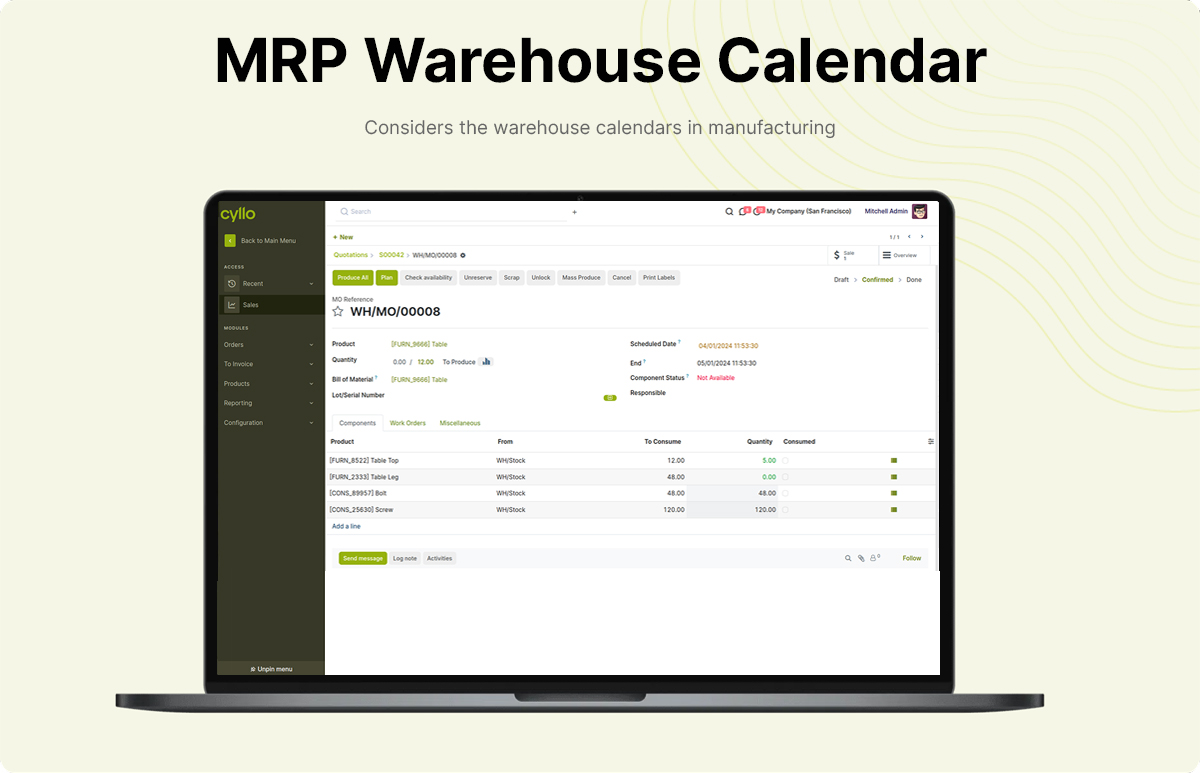
MRP Warehouse Calendar
With this module the manufacturing orders created from procurements consider the calendar assigned to the warehouse of the picking type of the manufacturing order to determine, based on the product’s manufacturing lead time, the planned start date of the manufacturing order. Further manual replannings of start/end date of the manufacturing order also consider the lead time using the warehouse calendar days.
Configuration:
- This module depends on stock_warehouse_calendar
- Go to Settings and activate the developer mode.
- Go to Settings > Technical > Resource > Working Time and define your resource calendar.
- Go to Inventory > Configuration > Warehouse Management > Warehouses and assign the Resource Calendar.
- Go to Inventory > Configuration > Warehouse Management > Routes and set up the proper delays in the procurement rules where ‘action’ is ‘Move From Another Location’.
Usage:
When a manufacturing order is created out of a procurement evaluation (from an orderpoint, MTO,…) the calendar is considered in the computation of the planned start date of the manufacturing order. For example, if it takes 1 day to manufacture a product and it is required for Monday, the manufacturing order will be created with planned start date on the previous Friday, if the warehouse operates under a Mo-Fri working calendar.
Improved Production Efficiency
By aligning production with warehouse operations, the module helps avoid delays and disruptions in the production process.
Enhanced Order Fulfillment
More accurate planned start dates translate to a higher likelihood of meeting customer delivery deadlines.
Settings
Go to Settings and activate the developer mode. Go to Settings > Technical > Resource > Working Time and define your resource calendar.

Assign the Resource Calendar
Go to Inventory > Configuration > Warehouse Management > Warehouses and assign the Resource Calendar.

GNU Lesser General Public License v3.0 This software and associated files (the "Software") may only be used (executed, modified, executed after modifications) if you comply with the terms of the GNU Lesser General Public License, version 3.0, available at https://www.gnu.org/licenses/lgpl-3.0.html. You may develop software that uses the Software as a library (typically by depending on it, importing it and using its resources), but without copying any source code or material from the Software. You may distribute those software under the terms of the GNU Lesser General Public License, version 3.0. It is forbidden to publish, distribute, sublicense, or sell copies of the Software or modified copies of the Software without including the complete text of the GNU Lesser General Public License, version 3.0, along with any applicable additional permissions. THE SOFTWARE IS PROVIDED "AS IS", WITHOUT WARRANTY OF ANY KIND, EXPRESS OR IMPLIED, INCLUDING BUT NOT LIMITED TO THE WARRANTIES OF MERCHANTABILITY, FITNESS FOR A PARTICULAR PURPOSE AND NONINFRINGEMENT. IN NO EVENT SHALL THE AUTHORS OR COPYRIGHT HOLDERS BE LIABLE FOR ANY CLAIM, DAMAGES OR OTHER LIABILITY, WHETHER IN AN ACTION OF CONTRACT, TORT OR OTHERWISE, ARISING FROM, OUT OF OR IN CONNECTION WITH THE SOFTWARE OR THE USE OR OTHER DEALINGS IN THE SOFTWARE.